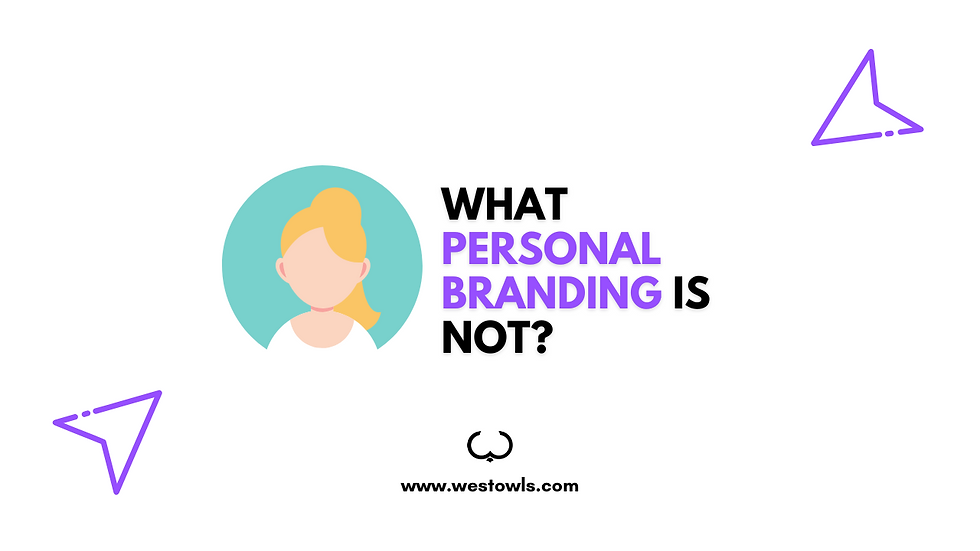Personal branding has become a buzzword in the world of social media, business, and marketing. While many people understand the importance of building a personal brand, there’s still plenty of confusion about what it actually involves. To truly benefit from personal branding, it’s essential to understand not only what personal branding is, but also what it is not.

In this article, we’ll explore some of the common misconceptions and clarify what personal branding is not, so you can avoid falling into these traps while developing your own brand.
Personal Branding is Not About Creating a Fake Persona
One of the biggest misconceptions about personal branding is that it’s about pretending to be someone you’re not. People sometimes assume they need to create a polished, larger-than-life image to stand out. In reality, personal branding is about being authentic—showcasing your true self and the unique value you bring to the table.
Building a personal brand based on a false persona is unsustainable. Sooner or later, people will notice the inconsistency, and it can harm your credibility. True personal branding is about aligning who you are with how you present yourself to the world.
What to do instead: Focus on sharing your real experiences, strengths, and personality. Be honest about your journey, and embrace your imperfections, as they’re part of what makes you relatable.
Personal Branding is Not About Self-Promotion 24/7
Personal branding isn’t simply about promoting yourself at every turn. It's easy to fall into the trap of thinking that the more you talk about yourself and your achievements, the stronger your brand will become. However, if your content and interactions are solely focused on self-promotion, you’ll come across as self-centered and out of touch with your audience’s needs.
What to do instead: Provide value to your audience. Share insights, offer solutions, and contribute to conversations that matter to your community. Personal branding is about building relationships and trust, not just showcasing your accomplishments.
Personal Branding is Not About Being Popular
Another misconception is that personal branding is about gaining followers and becoming popular. While a strong personal brand may result in more visibility and recognition, it’s not the end goal. Personal branding is about building reputation and credibility, not chasing likes or followers.
Popularity doesn’t necessarily translate into influence or business success. Instead, it’s about creating meaningful connections and being recognized for the value you provide, whether you have 500 followers or 50,000.
What to do instead: Focus on building influence rather than popularity. Engage with a niche audience that resonates with your message and expertise. Quality of
connections is more important than quantity.
Personal Branding is Not a One-Time Task
Some people believe that once they’ve defined their personal brand, they can sit back and relax. But personal branding is not a set-it-and-forget-it process. It requires continuous development, consistency, and effort to maintain. Your brand will evolve as you gain new experiences, skills, and knowledge.
What to do instead: Treat personal branding as an ongoing process. Keep refining your message, updating your content, and engaging with your audience. Be adaptable, and ensure your brand grows alongside your personal and professional development.
Personal Branding is Not Only for Entrepreneurs or Influencers
There’s a common misconception that personal branding is only relevant for entrepreneurs, celebrities, or social media influencers. In truth, personal branding is important for anyone who wants to stand out in their career, whether you’re a corporate professional, freelancer, or business owner.
Your personal brand is your professional reputation. It can help you secure job opportunities, promotions, partnerships, and more, regardless of the industry or role you’re in.
What to do instead: Recognize that everyone has a personal brand, whether intentionally crafted or not. Take control of how you’re perceived in your industry or community by being intentional about the image you project.
Personal Branding is Not Just About Visual Aesthetics
Many people equate personal branding with having a nice logo, a professional headshot, or a polished website. While aesthetics play a role in how your brand is perceived, personal branding goes far deeper than just appearances. It’s about your message, values, expertise, and the emotional connection you build with your audience.
What to do instead: Focus on substance. While having a cohesive visual identity is important, make sure your brand is backed by a clear, authentic message and consistent value creation.
Personal Branding is Not About Imitating Others
It’s tempting to look at successful personal brands and think that you should replicate their style, tone, or approach. However, personal branding is not about copying others. If you try to imitate someone else’s brand, you risk losing your authenticity and individuality.
What to do instead: Be original. Learn from others, but develop a brand that is uniquely yours. Identify what sets you apart and emphasize those qualities. Authenticity will always resonate more with your audience than imitation.
Personal branding is a powerful tool when used correctly, but it’s important to know what it is not to avoid common pitfalls. It’s not about creating a false image, constant self-promotion, or chasing popularity. Instead, personal branding is about authenticity, providing value, and building a reputation that’s aligned with who you truly are.
By understanding what personal branding is not, you can better focus on the principles that will help you create a genuine, influential, and lasting personal brand that stands out in today’s competitive world.

Comments